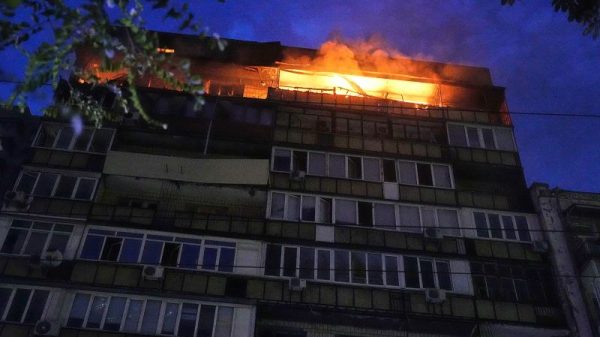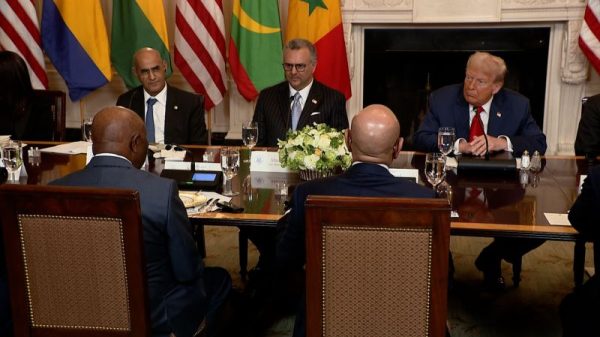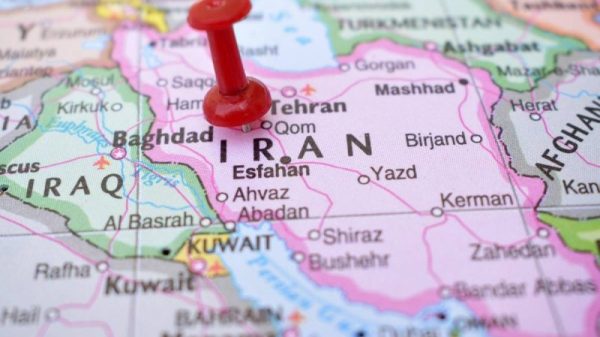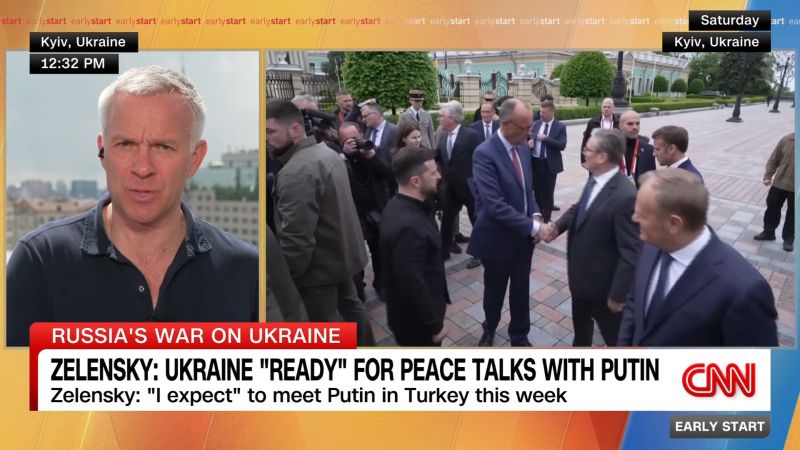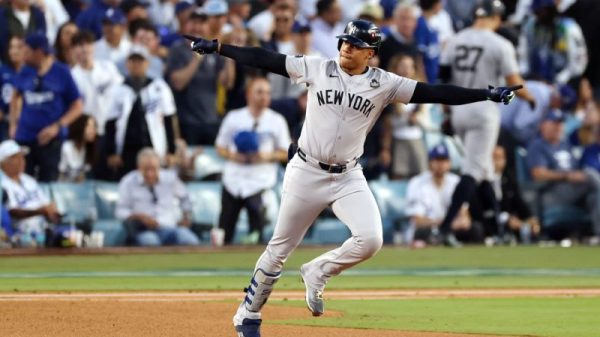For about 30 hours, the illusion of transatlantic unity over Ukraine was maintained.
Europe and Ukraine had demanded a deal on the 30-day unconditional ceasefire the Trump administration proposed two months earlier. European leaders said US President Donald Trump had personally backed their plan – and threat of sanctions if Russia declined to sign up by Monday – in a Saturday phone call, a picture of which they posted online from Kyiv.
Trump’s special envoy to Ukraine, Keith Kellogg, even joined a chorus of US allies demanding Russia adhere to the ceasefire demand.
But then Russian President Vladimir Putin spoke, refusing to even mention the demand, and instead presenting something old as something new: direct Russia-Ukraine talks in Istanbul, four days later. And transatlantic unity shattered. Trump leapt on the Kremlin proposal – simply stating on his Truth Social network that Putin didn’t want a ceasefire – and instead pressuring Ukraine’s President Volodymyr Zelensky to “HAVE THE MEETING, NOW!!!”
Again, the pendulum swung back. Trump had been conspicuously silent as the US’ longstanding allies trumpeted their newfound unity. Putin spoke, and Trump realigned.
Zelensky was left only able to show personal commitment and valor, and to offer to make the meeting a face-to-face with Putin, the man charged with war crimes against his nation. That is a tough move for him domestically.
It is important to not exclude the possibility that, behind the scenes, Moscow and Washington are hatching something bringing the world closer to peace. But as Trump spoke, European leaders seemed to, in turn, fall silent themselves. Ukraine’s skies did not.
On the night in which a ceasefire had been demanded, Russia launched 108 drones, carrying out strikes including one that trapped a 10-year-old girl under the rubble in Kherson region.
The significance of Saturday’s Kyiv declaration lay less in the immediate likelihood of an end to the fighting for a month. Europe’s leaders appeared intensely skeptical that their overture would garner Moscow’s approval. Instead, cynics might argue, the exercise was about proving to the White House that Putin was not interested in the peace, or indeed the specific ceasefire proposal, that the Trump administration sought.
But that was not the only “reveal” that Europe’s four largest military powers got for their complex and lengthy trip to the Ukrainian capital. Trump also improved their perspective on his real position too.
Putin is now thrice emboldened. He was able to completely ignore the European and Ukrainian demand – to not even mention it directly. Secondly, he has faced – as yet – none of the “massive sanctions” on Russia and boosted military aid to Ukraine that Europe appeared to suggest Trump backed, in the event there was no ceasefire.
Thirdly, his proposal for direct talks in Istanbul – nothing new there, bar the date of Thursday – suddenly became the bedrock of Trump’s position. The US president held out the possibility of consequences if those talks were fruitless. But yet another step was introduced in between Russia betraying its disinterest in peace, and Ukraine’s allies escalating their measures against Moscow.
The singular persistent theme in all the past few months of chaos is Trump’s reluctance to move in ways that damage his relationship with the Kremlin. We do not know if Trump and Putin spoke in between the Europeans’ visit to Kyiv and Trump posting on Truth Social. But perhaps we do not need to: Either way, when faced with a fork in the road between the unity his European allies seek, and a path in which Putin and he remain on better terms, Trump chose the latter.
The threat of sanctions – massive or not – was always a complex task. Russia is already heavily sanctioned, and there are limited moves still to be made of real consequence, without damaging the West significantly too. Key is whether Europe tries to inflict pain on Russia without American support. To do so would expose their disunity, but may be a better choice than their threats in Kyiv ringing hollow.
The meeting in Istanbul, if indeed it happens, is itself a hugely perilous step. Putin and Zelensky palpably despise each other. The former sees the latter as a pro-European traitor and а success symbol born of the imperial decline that Soviet-era bureaucrats have yet to accept. The latter sees the former as the man who invaded his country mercilessly without reason, and relentlessly bombs children, every night. It is more likely the men fail to find common ground than emerge, reconciled, with a path ahead.
It is not impossible that the White House, with US Secretary of State Marco Rubio in Turkey on the proposed date, and Trump in the region, tries to facilitate. Yet Putin has yet to even agree to attend, despite proposing the direct talks, making any acceptance now appear like some sort of grand gesture of peace. The United States being too deeply involved could backfire on their relationships with just about everyone.
The simplest conclusion to be drawn from the past few days is that Trump fails to see that Putin is seeking to buy time. The Kremlin’s forces appear to be reinforcing, not reducing, along a front line where they’re pushing hard near Pokrovsk in eastern Ukraine. The weekend’s deadlines have come and gone, exposing the brief moment of unity as an aberration, and the White House as unwilling to anger Putin.
The possible meeting in Istanbul is only three days away. But it will not bring peace immediately, or perhaps even a ceasefire at all, just diplomatic pageantry and significant personal animosity between two men from entirely different generations in the post-Soviet world. It may even set the peace process back, and again delay the moment when Trump must decide whether he will join his European allies in causing pain to Russia for refusing a truce.
What the answer to Trump’s postponed, vital decision, will be is already clear. How Europe and Ukraine fend for themselves is not.







